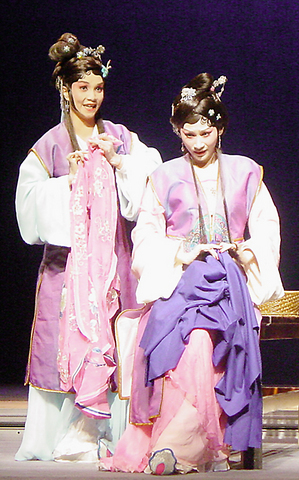In celebration of its 10-year Anniversary, Taiwan's National Guoguang Opera Company (
Peking Opera can be separated into two styles, one characterized by singing and the other by acrobatic and martial art movements, while some operas combine aspects of both.
Three People and Two Lamps will be a demonstration of the first style concentrating more heavily on the singing. Although Chinese operas often take a historical event or male figure as the basis for its plot line, the Guoguang's latest production focuses on the fictional events of its female lead characters.

PHOTO COURTESY OF NATIONAL GUOGUANG OPERA COMPANY
Set in the Tang Dynasty (618 AD to 906), the play centers on the tragic lives of three female maids, each of whom is pining for the emperor's love. Absorbed in the memory of one passionate night, Shiangchi, spends her days wondering in a trance through the garden, while Shuangyui takes refuge from her pain in the arms of another man. Realizing the futility of her love, Kuangji channels her attention to the other two women, one of which will meet with a tragic fate.
Shanghai's Gu Theater paved the way for Taiwan's Peking Opera movement in the 1950s. Invited to play for the Chinese Nationalist (KMT) troops in 1948, the theater helped to establish additional performance groups with financial support from the Ministry of National Defense. In 1995 sponsorship was transferred to the Ministry of Education and the troupes merged to form the National Guoguang Opera Company.
Shows are tonight and tomorrow at 7:30pm and Sunday at 2:30pm, Novel Hall (新舞台) at 3 Sungshou Road, Taipei (北市松壽路 三號). Tickets are available online at www.ticket.com.tw.

June 23 to June 29 After capturing the walled city of Hsinchu on June 22, 1895, the Japanese hoped to quickly push south and seize control of Taiwan’s entire west coast — but their advance was stalled for more than a month. Not only did local Hakka fighters continue to cause them headaches, resistance forces even attempted to retake the city three times. “We had planned to occupy Anping (Tainan) and Takao (Kaohsiung) as soon as possible, but ever since we took Hsinchu, nearby bandits proclaiming to be ‘righteous people’ (義民) have been destroying train tracks and electrical cables, and gathering in villages

Dr. Y. Tony Yang, Associate Dean of Health Policy and Population Science at George Washington University, argued last week in a piece for the Taipei Times about former president Ma Ying-jeou (馬英九) leading a student delegation to the People’s Republic of China (PRC) that, “The real question is not whether Ma’s visit helps or hurts Taiwan — it is why Taiwan lacks a sophisticated, multi-track approach to one of the most complex geopolitical relationships in the world” (“Ma’s Visit, DPP’s Blind Spot,” June 18, page 8). Yang contends that the Democratic Progressive Party (DPP) has a blind spot: “By treating any

This year will go down in the history books. Taiwan faces enormous turmoil and uncertainty in the coming months. Which political parties are in a good position to handle big changes? All of the main parties are beset with challenges. Taking stock, this column examined the Taiwan People’s Party (TPP) (“Huang Kuo-chang’s choking the life out of the TPP,” May 28, page 12), the Democratic Progressive Party (DPP) (“Challenges amid choppy waters for the DPP,” June 14, page 12) and the Chinese Nationalist Party (KMT) (“KMT struggles to seize opportunities as ‘interesting times’ loom,” June 20, page 11). Times like these can

Swooping low over the banks of a Nile River tributary, an aid flight run by retired American military officers released a stream of food-stuffed sacks over a town emptied by fighting in South Sudan, a country wracked by conflict. Last week’s air drop was the latest in a controversial development — private contracting firms led by former US intelligence officers and military veterans delivering aid to some of the world’s deadliest conflict zones, in operations organized with governments that are combatants in the conflicts. The moves are roiling the global aid community, which warns of a more militarized, politicized and profit-seeking trend